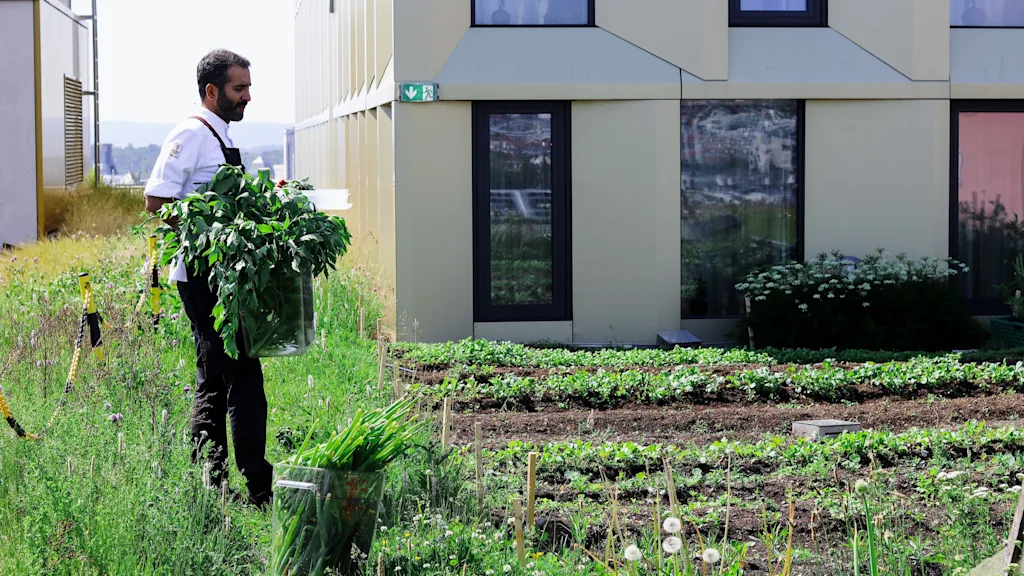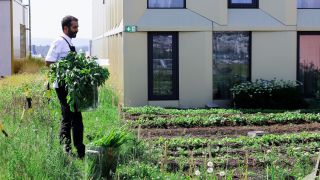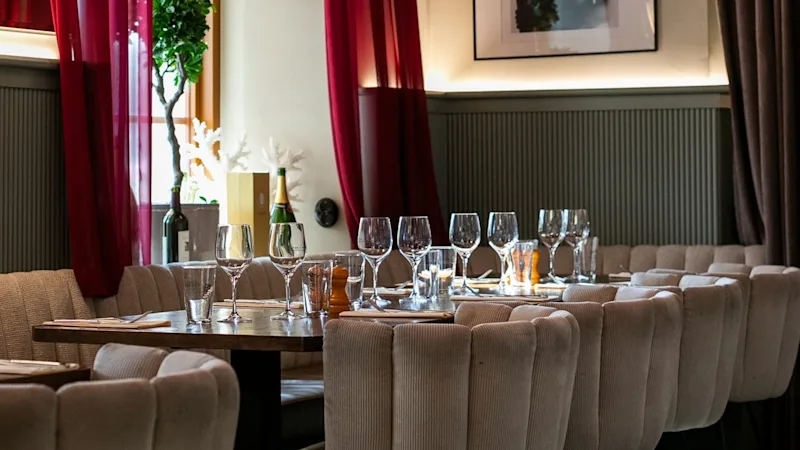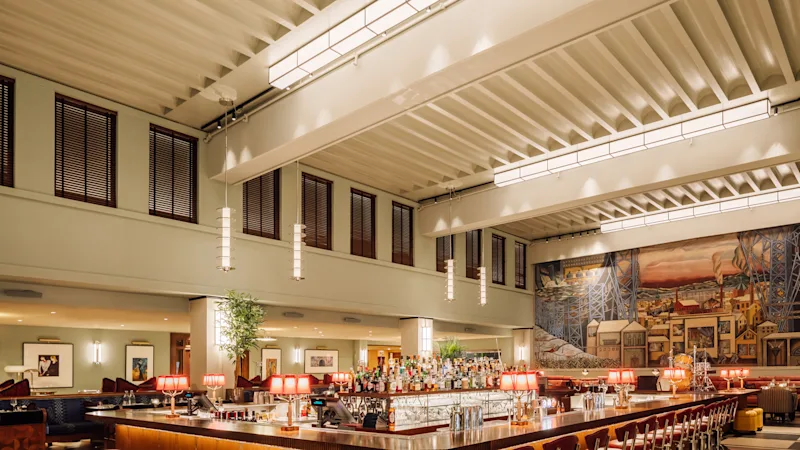The secret is out – we're taking a critical look at our own sustainability work
It's easy to talk about working with sustainability, but it's quite another thing to disclose the full picture. However, in order to make a real difference to the climate, the environment and people, there needs to be a clear plan, concrete actions and...total transparency! We're raising our game and open up our doors to you to allow you to see just what we're doing when it comes to sustainability and where there is room for improvement. And that's thanks to a group of mysterious, committed hotel guests.

We’re not wanting to brag (or just a little perhaps…), but we have always done more than has been expected of us when it comes to our guests, colleagues, society and the environment. When you manage more than 230 hotels, it’s obvious that you need to take some social responsibility and expand your horizons, while also taking the best possible care of the environment and the people around us on this planet (thus far the only habitable one we know of – time will tell), and of course making sure that we stay profitable.

We feel that we’ve been working hard in this area for many years, by installing solar cells at several hotels, reducing water consumption with the help of sensor-controlled mixer taps, cutting all unnecessary plastic products, using fewer chemicals, supporting ethical trade and introducing measures to reduce food waste – in addition to many more things. And yes – our hotels are also environmentally certified according to the international standard ISO 14001. Maybe you already knew?
You’ve heard it all before?
You may well say that you’ve heard it all before. We know it’s easy to spout a lot of words and that anyone can claim to be working with sustainability. How can you find concrete proof that the work we do is paying off and that we are actually making a difference? How can people keep us accountable to our promises?
Those are the questions that a special group of guests had us mull over. This group known as The Chosen, were brought together a few years back as Covid management scouts. Their questions eventually led to the introduction of our own system, known as the Sustainability rating, whereby we critically review our own sustainability work and allow the general public to have a front-row seat while we do so.
"This rating shows how well the hotels are doing in improving their consumption of energy, water, refuse, food waste, chemicals and textile laundry.”
We’re basically opening up the door and exposing ourselves. That’s the only way we can improve! And if you’re keen to find out more about The Chosen, there’s more on them below! But first, what’s the deal with the Sustainability rating?
– This rating shows how well the hotels are doing in improving their consumption of energy, water, refuse, food waste, chemicals and textile laundry. These are the areas that have the greatest environmental impact within hotel operations. The rating is presented on a 10-point scale on our website, based on measurements made individually at the respective hotel, says Harald Bjugstad-Holm, Sustainability Director at Strawberry.
No one is completely honest
Hmm, an internal sustainability rating… How likely is that a self-assessment will garner trust? Well, we are certainly aware that you may have certain reservations. But regardless of how you view our internal rating system, one thing is certain: this is a tool that allows us to get concrete answers to how the various hotels can be improved – and we are constantly aiming to get better!
– We want to know whether hotels are reaching their sustainability goals, and this rating will provide the answers. We see how various sustainability reviews are published within the hotel industry today, but none of them are completely honest about how they are actually working to improve. Since we have all the information available internally, we also want to be 100% transparent with our guests when it comes to providing the answers and how we work with such improvements. Thereby guests can make conscious and sustainable choices, while also demanding more from us, so that we can continue to improve our sustainability efforts, says Harald.
Tough targets?
Our goals include being climate-neutral within our own operations by 2030, halving the emissions in our supply chain and reducing food waste by 50% by 2026. These are tough yet attainable targets! Having said that, it is still important to point out that it has been a long road to the creation of our own, internal, critical Sustainability Rating. And it all began with… Covid!
We basically brought together a group of different people from all over the place – an eclectic bunch in other words! We named them The Chosen and tasked them to go undercover for us travelling around our hotels to see if Covid-restrictions were being followed.
"I think it was a good combination of being able to enjoy the various hotels, while helping to make the hotels better and safer."
Almudena Vargas (31), who normally works in logistics at the Oslo Public Library in the Bjørvika district, was selected from 100 people to be part of the group, after seeing an ad in an article on our website.
– I was actually planning to have a long summer holiday in Spain, where I’m originally from, but in light of the strict border controls, I chose to have a two-month holiday in Norway instead. That’s probably why I was chosen to be a ”scout”. You wanted people who enjoyed travelling and we were supposed to complete our mission while on a private trip. I think it was a good combination of being able to enjoy the various hotels, while helping to make the hotels better and safer during the Covid period, says Almudena.
It’s not enough with big heard-it-all-before words
After a while, The Chosen got their own Facebook group where they exchanged experiences and shared thoughts about hotel operations – not just about Covid restrictions. We saw that the group’s commitment could be used for something more at Strawberry after Covid finally settled down, and we realised that most people wanted to continue scouting. In order to create the best possible guest experience, it’s not a bad idea to have ordinary people on the inside.
But that eager group cared about more – they were also interested in sustainability and how we work with these issues. However, they couldn't find any concrete information, other than big fluffy heard-it-all-before words.
– It began with some comments from people in the Facebook group about how the hotels were being run. For example, we discovered that lemonade imported from Italy was being sold, and that the glass bottles it came in couldn’t be recycled via the national deposit scheme, that it was super expensive and that it didn’t even taste good. It seemed like it wasn’t necessary, profitable or sustainable, Almudena says enthusiastically.
That made the group reflect on why there was no concrete information about what the hotels are actually doing to reduce food waste, their climate impact and everything related to so-called sustainable operations. They expressed a desire for greater transparency, and of course we took that very seriously. We are certainly not trying to hide anything from our guests.
“Strawberry took us seriously. After a while, you presented us with a proposal for a sustainability rating and you asked what we thought should be included, i.e. how it should be designed and so on. As “the man on the street”, we were in a good position to be able to come up with suggestions on how a rating should be presented to all those people out there who are not sustainability experts, says Almudena.
Information is knowledge
That’s how our Sustainability rating came into being! We are proud and delighted to finally be able to show the world how we work with sustainability, while also showing what we do to keep improving. But does Almudena believe in such a rating, and does she think others will trust it?
– Some people are sure to be sceptical to the rating given that it is internal. Having said that, I think that the scepticism will fade once you see that this is actually a useful tool that provides concrete information you don't necessarily get from other industries – information that enables guests to make better and wiser choices. People are becoming more and more involved in the climate and the environment. This rating can make you a driving force and a role model for other actors that are not as transparent. Information is knowledge, and it is important that everyone in the hotel industry prepares for society’s expectations of hotel operations in the future, says Almudena.
Hotels must exceed expectations
OK, so now we have our Sustainability rating – but how is a top score actually measured in this ratings system?
– To receive top marks, the hotel must exceed expectations and deliver top notch results in all areas. A high rating does not mean that the hotel has the lowest environmental impact, but rather that they have made major improvements. With this rating, each hotel gets a good foundation to see where they need to improve, Harald concludes.
We obviously see the importance of involving guests in the daily hotel operations. All hotel guests are already able to provide feedback and suggest improvements as part of their stay. Long term, the plan is to include human aspects, such as diversity, welfare and local social responsibilities, in the rating. After all, we care about both the planet and the people that live on it.
More about our Sustainability rating:
- Internal rating that reflects how the hotels perform in various sustainability areas.
- Each hotel makes a forecast of its estimated consumption, based on the estimated occupancy.
-
- The actual consumption data is collected daily from suppliers, such as electricity providers and laundry services, and this is registered in a central system that generates a rating for each hotel.
-
- The rating is presented on a 10-point scale and is an average of the last seven days.
-
- The result factors in the number of guests per night, to obtain a scale that is as uniform as possible for comparison with all the other hotels.
-
- The rating is based on how the hotels perform over time with respect to their goals of reducing environmental impact in the areas of energy, refuse, food waste, chemicals, textile laundry and carbon emissions.
-
- The system is transparent internally and hotels that still have quite a way to go on their sustainability journey can learn from hotels that perform better.
You can find out more about our Sustainability rating and our sustainability-work.

